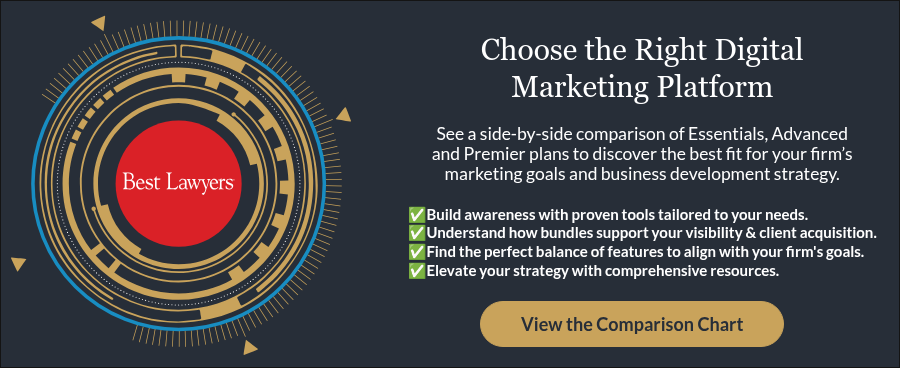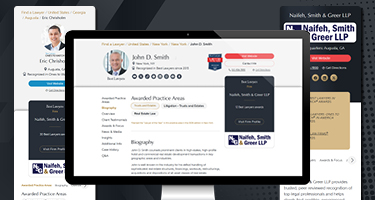When you search for your law firm on Google, what do you see? If it takes more than a few seconds to locate your firm, your website may be missing out on the necessary traffic to generate new business referrals. Instead, potential clients may be finding your competitors and contacting their offices.
Not only did you invest heavily in a website, but a poor-performing law firm's SEO strategy could cost you in other areas as well. Your firm’s visibility, credibility and even paid advertising costs could suffer from a poorly optimized website. Bottom line—a strong law firm SEO strategy is essential to success.
Why Law Firm SEO Matters
You don’t need to be a digital marketing expert, but understanding the basics will help you make intelligent decisions about optimizing your website or selecting an SEO specialist. Whether you handle SEO in-house or outsource it to a digital marketing agency, having a firm understanding of SEO fundamentals is crucial.
Here are a few basics you should know, along with free online resources to help you gain a better understanding of SEO.
Best Practices for Law Firm SEO
Below are a few essential steps to consider when optimizing your law firm’s website. These tips will help you enhance your visibility in search engines and connect with more potential clients.
Understand Keyword Research
Choosing the right keywords is the foundation of any successful law firm's SEO strategy. Start by understanding what clients are searching for and you'll be able to create content that is more likely to attract relevant traffic. To begin your keyword research, you can use free tools like Google Keyword Planner or Ubersuggest, which can help you identify the terms potential clients are using to find legal services.
Create SEO-Friendly Content
Content plays a critical role in law firm SEO. Make sure your website is filled with informative, valuable content that addresses the needs and questions of your potential clients.
Optimizing this content for SEO involves using keywords naturally throughout your website and ensuring that each page is focused on a specific topic or legal service.
Leverage Backlinks
Backlinks, or links from other reputable websites to yours, play a crucial role in law firm SEO. Search engines use backlinks as a signal of authority and trustworthiness. A website with more reputable backlinks is more likely to achieve a stronger position in search engine rankings.
Optimize Your Website for Local Searches
Local SEO is especially important for law firms, as many potential clients search for legal services within a specific geographic area. Optimizing your law firm’s website for local searches can help you appear in Google’s local pack, which lists businesses near the searcher’s location.
Google My Business for Law Firms
One of the most effective ways to improve your law firm’s local SEO is by setting up a Google My Business profile. This free tool allows you to list important information like your firm’s address, phone number and office hours. It also enables clients to leave reviews, which can boost your credibility and rankings in local searches.
Online Reviews
Positive client feedback plays an important role in local SEO rankings. If allowed by your state's Bar Association, encourage happy clients to share their testimonials on your websites and sites like Google or Yelp.
Find Out How Your Website Is Performing
To evaluate how your website is performing, start by checking your site’s visibility in search engines. If your law firm doesn’t appear within the search results, you need to work on your law firm's SEO strategy.
However, it’s important not to rely solely on your website rankings as a key performance indicator (KPI), as search results are often personalized and inconsistent.
Know the Basics of Search Engine Crawling and Indexing
To ensure your website is visible in search results, it's important to understand how search engines like Google and Bing discover and rank web pages. This process begins with search engine crawlers—automated bots that scan the internet, moving from one page to another via links.
How Search Engines Crawl and Index Your Website
These crawlers, such as Google’s Googlebot, visit websites to gather information and add the content they find to the search engine's index. Once your website is indexed, search engines use complex algorithms to determine where and when your site should appear in search results.
Factors That Influence Your Ranking
This ranking is influenced by a variety of factors, including content relevance, keyword optimization and user intent—what the searcher is looking for. Ensuring your website is easy to crawl and contains relevant, well-structured content can help improve your chances of ranking well.
Numerous online resources are available to help you dive deeper into search engine crawling and indexing and understand the technologies behind how search engines work. Google Search Central is a fantastic resource for SEO beginners.
Tools to Track Performance
Set up a Google account for your law firm and utilize Google Search Console and Google Analytics to track your website’s performance. These tools provide valuable insights into search engine visibility and user behavior.
To gain more comprehensive insights, consider using advanced SEO tools like Semrush, Ahrefs and Moz, which offer in-depth tracking capabilities. However, these tools are only recommended if you plan to handle SEO internally.
Making a Great First Impression in the Search Results
A great law firm website doesn’t just need to look good—it also needs to make a strong first impression in search engine results. When users search for legal services on Google or another search engine, they often make split-second decisions based on the information they see in the search results.
This is where your page title and meta description come into play, serving as your law firm's first opportunity to attract potential clients.
Crafting Strong Page Titles and Meta Descriptions
Your page titles and meta descriptions should accurately describe the content on your page while incorporating relevant keywords, but there’s more to it than just content quality. Both elements must also meet specific length requirements to ensure they display correctly in search engine results.
Page Titles
The ideal length for page titles is around 55-60 characters. If your title exceeds this limit, search engines will truncate it, meaning that important information, such as your keywords or law firm's name, may be cut off. This can negatively impact your click-through rate (CTR), as users are less likely to click on incomplete or unclear listings.
Meta Descriptions
For meta descriptions, aim for a length between 150-160 characters. Similar to titles, meta descriptions that are too long will be cut off, which could result in users not getting the full picture of what your page is about. This is especially important in competitive fields like law, where potential clients are comparing multiple listings and are more likely to click on results that are clear and concise.
Incorporating relevant keywords naturally in your titles and descriptions not only improves your chances of appearing in relevant searches but also helps search engines understand what your page is about.
For example, a page about personal injury law might have a title like: “Personal Injury Lawyers in Manhattan – Law Firm Name,” and a meta description like: “Our personal injury lawyers have decades of experience helping Manhattan residents get the compensation they deserve.”
By adhering to these length guidelines, you’re not only optimizing your law firm SEO but also making it easier for potential clients to find and click on your listing.
How Google Adjusts Your Search Listing
While you have control over your page titles and meta descriptions, Google may sometimes modify them to better align with a user's search intent.
This happens when the search engine believes the existing title or description isn't fully relevant to the specific query. For instance, Google might generate a new snippet from the page content that better matches the search terms used.
This is why writing high-quality content that incorporates keywords naturally throughout the page is critical. If Google pulls content from your page to create a new snippet, it’s essential that this content is clear, keyword-rich and directly relevant to the user's search.
The more relevant your page titles, meta descriptions and content are, the more likely Google will keep them as-is and display your listing in the best possible way.
By following best practices for page titles, meta descriptions and keyword usage, you not only improve your law firm’s SEO but also increase your chances of attracting potential clients from search results.
Parting Thoughts
Whether you're just getting started or looking to refine your current approach, understanding the fundamentals of law firm SEO can dramatically impact your online presence and attract more potential clients.
The first step is to have a well-designed website, which is the foundation for a strong SEO strategy.
Discover more tools to improve your law firm’s SEO strategy and online presence with the Best Lawyers Digital Marketing Platform.
To see how your firm appears to potential clients, visit Best Lawyers to find a lawyer and review how top-ranked professionals present their expertise online.


































